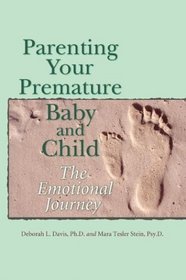Search -
Parenting Your Premature Baby and Child: The Emotional Journey
Parenting Your Premature Baby and Child The Emotional Journey
Author:
The premature birth of your baby or babies is a medical crisis. But more than that, it is a family crisis. When your baby* is born too soon, you must face not only the medical aspects of prematurity but also the many emotional aspects of parenting your premature baby. During hospitalization, after homecoming, and perhaps throughout childhood, th... more »
Author:
The premature birth of your baby or babies is a medical crisis. But more than that, it is a family crisis. When your baby* is born too soon, you must face not only the medical aspects of prematurity but also the many emotional aspects of parenting your premature baby. During hospitalization, after homecoming, and perhaps throughout childhood, th... more »
ISBN-13: 9781555915117
ISBN-10: 1555915116
Publication Date: 5/2004
Pages: 928
Rating: ?
ISBN-10: 1555915116
Publication Date: 5/2004
Pages: 928
Rating: ?
0 stars, based on 0 rating
Genres:
- Health, Fitness & Dieting >> Personal Health >> Women's Health >> Pregnancy & Childbirth >> General
- Health, Fitness & Dieting >> Personal Health >> Children's Health >> Children with Disabilities
- Parenting & Relationships >> Parenting >> Early Childhood >> Infants
- Parenting & Relationships >> Parenting >> General
- Parenting & Relationships >> Disabilities & Hyperactivity >> General
- Parenting & Relationships >> General




